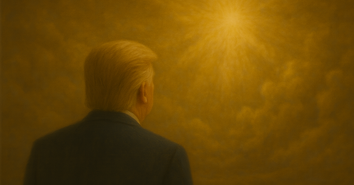How to Find Peace in Christ When the World Is in Turmoil
According to reports, the Russia-Ukraine war recently entered a new phase. When the Ukrainian army moved into Russia, it became arguably the first time in history a nuclear-armed nation lost part of its core territory. At the same time, the situation in the Middle East continues to unravel. For months, western naval forces in the Red Sea have been battling Islamist rebels out of Yemen, and Israel continues its retaliation in Gaza for the Hamas massacres last October while also having to respond to Hezbollah in Lebanon. All this as the potential grows for a wider conflict involving Israel, Iran, and possibly the United States.
Meanwhile, Venezuelan incumbent Nicolás Maduro lost re-election, but to no one’s surprise, his Marxist regime has refused to yield power, sparking riots across the country. The Prime Minister of Bangladesh was recently forced from office, which has opened the door to Islamist attacks on the Hindu minority. In Africa, from Nigeria to Sudan, a combination of Muslim insurgents and Russian mercenaries are attempting to take power. And, of course, tensions between America and China have been escalating in the Pacific for a while now.
Future historians may refer to our moment as “the early days of World War III,” but is this an extraordinary time of crisis? In one sense, we live in a remarkably peaceful time. There has not been a war between any of the Great Powers in generations. On the other hand, there have been plenty of wars, and peace has been maintained by a mutual threat of mass destruction.
And there have been numerous close calls. In 1983, Soviet authorities nearly mistook a NATO exercise in Europe as a prelude to invasion. Twenty years earlier, there was the Cuban Missile Crisis. And 15 years before that, only months after the end of World War II, the Berlin Crisis nearly sparked World War III.
The wars of Napoleon and the French Revolution caught up most of Europe in combat. The American Revolution, the French and Indian War, and the War of Spanish Succession were, in a sense, world wars. The Chinese and Russian civil wars resulted in millions of lives lost each. During the Taiping Rebellion, 20 million people were killed, placing it among the top five wars in history, if that dark rating system is used.
All those wars have occurred since 1700. The thousands of years of human history before that are also filled with bloodshed. So, depressing as it may be, wars are an ordinary part of the human experience, rather than extraordinary.
Like all aspects of the human condition, this one is also best explained within a Christian worldview. Matthew 24 describes a conversation in which Jesus’ disciples asked about the end of the age. Jesus answers:
And you will hear of wars and rumors of wars. See that you are not alarmed, for this must take place, but the end is not yet. For nation will rise against nation, and kingdom against kingdom, and there will be famines and earthquakes in various places. All these are but the beginning of the birth pains.
A former colleague believed that Jesus’ answer here was tinged with a bit of sarcasm. He imagined the disciples thinking they were getting some inside scoop on the end times, furiously writing down these clues while muttering, “ooh, that’s good stuff.” But what Jesus described is the common experience of humanity since the Fall, nearly everywhere. Wars come and go, but the key mark of Christian faithfulness isn’t figuring out the signs and predicting the future. Rather, it’s remaining ready for Christ’s return by “enduring to the end.”
Disorder is the ordinary state of things between Eden and the New Jerusalem. And yet, despite how common war is, we still experience it as abnormal. Sure, there is more than a bit of normalization that can occur after long periods of unrest and conflict, but the fact that we recoil at violence, resist war as much as we do, and strive for peace says something else as well. The world is not as it should be.
In other words, humans, broken by sin, have broken a world intended by God for flourishing. Wrongs must be opposed and, at times, confronted. And yet, peace is still possible.
This moment, chaotic and vulnerable as it is, is best understood within the larger story told by Scripture. War will not have the final word. This world belongs to God, and He will make all things new.
Dr. Timothy Padgett co-authored this Breakpoint. If you’re a fan of Breakpoint, leave a review on your favorite podcast app. For more resources to live like a Christian in this cultural moment, go to breakpoint.org.
Photo Credit: ©Getty Images/Dimitri Otis
Published Date: August 23, 2024
John Stonestreet is President of the Colson Center for Christian Worldview, and radio host of BreakPoint, a daily national radio program providing thought-provoking commentaries on current events and life issues from a biblical worldview. John holds degrees from Trinity Evangelical Divinity School (IL) and Bryan College (TN), and is the co-author of Making Sense of Your World: A Biblical Worldview.
The views expressed in this commentary do not necessarily reflect those of CrosswalkHeadlines.
BreakPoint is a program of the Colson Center for Christian Worldview. BreakPoint commentaries offer incisive content people can't find anywhere else; content that cuts through the fog of relativism and the news cycle with truth and compassion. Founded by Chuck Colson (1931 – 2012) in 1991 as a daily radio broadcast, BreakPoint provides a Christian perspective on today's news and trends. Today, you can get it in written and a variety of audio formats: on the web, the radio, or your favorite podcast app on the go.








